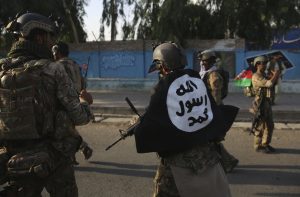Afghan forces retook a prison in the country’s east on Monday afternoon, following an hours-long gunbattle a day after the facility was targeted by Islamic State militants in an attack that killed 29 people. The prison is believed to hold hundreds of IS members.
The attack highlighted the challenges ahead for Afghanistan, even as U.S. and NATO forces begin to withdraw following a U.S.-Taliban peace deal struck earlier this year.
Afghan Defense Ministry spokesman Fawad Aman said the prison in Jalalabad, the capital of Nangarhar province, located some 115 kilometers (70 miles) east of Kabul, was taken back in the afternoon — 24 hours after it came under attack. The fighting had also left at least 50 wounded, he said.
Even as Afghan troops retook the prison, IS militants continued to fire on Afghan security forces from a nearby neighborhood. Sporadic gunfire rang out from nearby residential buildings in central Jalalabad, an area of high security near the provincial governor’s office.
As security forces swept through the prison, they found the bodies of two Taliban prisoners apparently killed by the Islamic State group, showing the tensions between the two militant factions battling each other in eastern Afghanistan.
The 29 dead included civilians, prisoners, guards, and Afghan security forces, said Attaullah Khogyani, the provincial governor’s spokesman.
After the fighting was over, Afghan forces held up a black IS banner captured during the battle. From behind windows with bars, several Taliban prisoners peeked out at reporters and media crews at the scene.
The attack began Sunday, when an Islamic State suicide bomber drove a car laden with explosives up to the prison’s main gate, detonating the bomb. Islamic State militants opened fire on the prison’s guards and poured in through the breach.
The IS affiliate in Afghanistan, known as Islamic State in Khorasan Province and headquartered in Nangarhar province, later claimed responsibility for the attack.
However, some of the 1,500 prisoners there escaped during the fighting. Khyogyani said about 1,000 prisoners who earlier escaped had been found by security forces across the city. It wasn’t immediately clear if any prisoners were still at large.
The attack came a day after authorities said Afghan special forces killed a senior Islamic State commander near Jalalabad. Several hundred prisoners in Jalalabad are believed to be Islamic State members.
The fighting ended after the final attackers, holed up in the nearby residential complex, were killed, said Aman, the defense ministry’s spokesman. He said 10 IS attackers were also killed in the operation and that the assailants killed five prisoners, including two members of the rival Taliban, before the raid ended.
While the Islamic State group has seen its so-called caliphate stretching across Iraq and Syria eliminated after a yearslong campaign, the group has continued fighting in Afghanistan. The extremists also have battled the Taliban in the country, whom the United States overthrew following the 2001 American-led invasion after the 9/11 attacks.
The Taliban’s political spokesman, Suhail Shaheen, told The Associated Press that his group was not involved in the Jalalabad attack. The United States struck a peace deal with the Taliban in February. A second, crucial round of negotiations between the Taliban and the political leadership in Kabul has yet to start.
The Taliban had declared a three-day ceasefire starting last Friday for the major Muslim holiday of Eid al-Adha. The cease-fire expired at 12 a.m. Monday, though it wasn’t immediately clear if it would be extended as the U.S. pushes for an early start to intra-Afghan negotiations that have repeatedly been delayed since Washington signed the peace deal with the Taliban.
“We have a ceasefire and are not involved in any of these attacks anywhere in the country,” Shaheen said.
The Taliban also had denied being involved in a suicide bombing in eastern Logar province late Thursday that killed at least nine people and wounded 40.
Afghanistan has seen a recent spike in violence, with most attacks claimed by the local IS affiliate.
By Rahmat Gul and Rahim Faiez for the Associated Press.
Faiez reported from Kabul, Afghanistan. Associated Press writer Kathy Gannon in Islamabad contributed to this report.

































